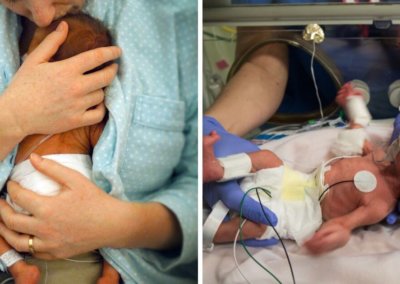A cross-party group of Parliamentarians including MPs, Peers and Westminster policymakers attended an event hosted by the All-Party Parliamentary Pro-Life Group (Pro-life APPG) on the evidence of survival rates for extremely prematurely-born babies, which was also broadcast as a webinar. Paul Girvan MP moderated the event.
Professor and medical doctor John Wyatt, Professor of Ethics and Perinatology at University College London and also Emeritus Professor of Neonatal Paediatrics, Ethics & Perinatology at University College London, showed the Parliamentarians evidence from the UK and across the world “that there has been a steady improvement in the chances of survival of babies born at 22 and 23 weeks gestation since the Abortion Act was last amended [in 1990]”.
The abortion limit was reduced to 24 weeks in 1990, which, at the time, was considered the point at which a baby could survive outside the womb. Now, however, Professor Wyatt argued, medical techniques and technology have improved, and “the current abortion time limit of 24 weeks is not consistent with survival figures for babies born at 22 and 23 weeks gestation, and with current clinical neonatal and paediatric practice”.
Babies regularly survive below the abortion limit
Professor Wyatt cited, in particular, data from the British Association of Perinatal Medicine’s 2019 Code of Practice, which indicated an approximate 30% survival rate in babies born at 22 weeks.
While stressing his role as a doctor rather than a legislator, Professor Wyatt suggested that if legislators intended to keep the link between the abortion limit and viability, the abortion limit should be lowered to 22 weeks.
“I would certainly say that, given the advances in science, it would be important that [the link between the abortion limit and viability] was regularly reviewed in order to see whether the gestational age limit was still appropriate”.
A baby is considered extremely premature if he or she is born before 28 weeks. At this stage of gestation, they typically weigh around a kilo.
The abortion limit was originally set at 28 weeks due to the Infant Life Preservation Act (1929) but was lowered in 1990. The Parliamentary debate at the time indicates that the primary reasons for doing so were improvements in survival rates for extremely premature babies.
Right To Life UK spokesperson, Catherine Robinson, said: “While every abortion is wrong and a great tragedy, there is something especially devastating about ending the life of a baby capable of being born alive. Our current abortion law creates a bizarre situation where doctors in one room of a hospital can be working to save the life and care for a baby born at 22 weeks, while in another room, a doctor could perform an abortion to end the life of a baby at the same gestational age or older. Surely this contradiction needs to end?”
“The abortion law in this country must change and babies in the womb must be offered legal protection throughout their gestation.”












